Vespertine Restaurant
3599 Hayden Ave, Culver City, CA 90232
323-320-4023
www.vespertine.la
Sat 09/21/2024, 08:00p-12:25a
![Vespertine Exterior]()
Chef Jordan Kahn opened Vespertine back in July 2017, and it quickly garnered both love and hate for its esoteric, genre-defying menu. Sadly, I never made it out to Vespertine 1.0, but when the pandemic struck, the restaurant pivoted to serving the most ambitious takeout LA had ever seen, and I ended enjoying a number of their to-go meals during this period. In the autumn of 2020, it was announced that Kahn and his team were taking over the shuttered Auburn space on Melrose, which eventually opened as Meteora in June 2022. With that out of the way, the Chef was free to refocus his attention on Vespertine, and it ultimately reopened on April 2nd this year. In August, the restaurant successfully earned its two Michelin stars back, which it had lost in the 2022 guide, and I was eager to pay the place a visit to see what all the fuss was about.
![Vespertine Outdoor Seating Area]()
Upon my arrival, I was immediately drawn to Vespertine's outdoor seating area, which, from what I understand, isn't being used for anything at the moment.
![Vespertine Entrance Area]()
I then entered the Eric Owen Moss-penned building and took a seat in the waiting area, as my dining companion was running late. From my vantage point, I was afforded a view of other diners wrapping up their meals with dessert.
![Vespertine Kitchen]()
From there, we took the elevator up to the third floor kitchen, and I was impressed by the level of quietude and stoicism displayed by the staff.
![Vespertine Dining Room]()
We were then led down to the surprisingly small second story dining room, which I estimate can accommodate 20 or so diners per seating.
![Vespertine Menu]()
![Vespertine Supplements Menu]()
![Vespertine Vitality Pairing]()
![Vespertine Wine List]()
Here we see the menu, which is priced at hefty $395 per person. On top of that, there are various supplements on offer as well. The caviar and truffle represented additions to the mussel and corn custard courses, respectively, while the wagyu replaced the lamb and the uni replaced the birch ice. Libation-wise, choices included a non-alcoholic Vitality beverage pairing for $125, a mixed beverage Dynamic pairing for $175, or the Vinifera wine pairing for $295. Annoyingly, Vespertine doesn't actually have a proper wine list (consultation with a sommelier is required instead), though an abbreviated selection of wines available by the glass and bottle is available, as shown above. Corkage is $100, with a limit of only one. Click for larger versions.
![Warm Towel]()
Upon being seated, a pair of oshibori was placed before us, warmed up for the cooler autumn weather we'd been having. The towels were more aromatic than most, giving off an almost mushroom-y scent.
![2012 Vilmart & Cie 'Les Blanches Voies' Blanc de Blancs]()
Given my love of Champagne, I brought along a bottle of the 2012 Vilmart & Cie "Les Blanches Voies" Blanc de Blancs (bottle Nº 4134/5800, disgorged November 2020) to pair with dinner. The bouquet presented itself in an intense, heady manner, offering up incredibly inviting aromas of warm brioche and stone fruit preserves. The palate wasn't quite as flamboyant, but still demonstrated a healthy amount of flowers, citrus, and orchard fruit, backed by an omnipresent underpinning of minerality. My second glass brought more toast-and-jam than probably any other sparkler I've tasted, while taste-wise, I began detecting more nutty, oxidative elements. Next, things got markedly yeastier and earthier, both on the nose and the tongue, but this didn't last long, as soon enough, the wine's mineral backbone became much sharper, much more apparent. Toward the end of the night, I started tasting even stronger sherried nuances, which certainly made for a fitting conclusion. Absolutely lovely.
![WILD SCALLOP]()
1: WILD SCALLOP | passionfruit, aji amarillo
Our first, decidedly monochromatic course presented slices of Weathervane scallop in both raw and cured forms. Curiously, the dish smelled somewhat of pàocài at first blush, which I didn't mind at all, and this sensation soon led to a juxtaposition of the creamy-sweet scallops with the tropical tartness of a passion fruit reduction, set over a backdrop of creeping heat from the ají. At the same time, there was a top layer of contrast between the dry, brittle horseradish crisps and those silky petunia petals, an interplay that really was key in helping the dish coalesce. My dining companion likened this to a thoroughly reimagined salad course to start the meal with, and I think that's an apt comparison.
![KIWI OXALIS VERBENA]()
KIWI OXALIS VERBENA
In addition to the Vilmart above, we also opted for the non-alcoholic pairing, and first up was a housemade kiwi juice with oxalis and lemon verbena. Think refreshingly tangy and grassy on the nose, with a soft, sweet, tropical flavor profile.
![SUMMER (without Broth and Crackers)]()
![SUMMER]()
2: SUMMER | peas, wildflowers
Rather striking in presentation, this celebration of summer was composed primarily of wild herbs and flowers--some foraged and some grown in Vespertine's garden--along with snap pea shells, Allium, yuzu, kiwi, and puffed rice pearls. As you might expect, this ate super fresh, bright, and floral, with a wonderfully bitter spine and a creamy foundation, all while the arare imparted both crunch and savor. And despite the dish essentially being composed of flowers, it was surprisingly substantial. I also appreciated the bowl utilized, which required me to dig deep with my spoon, scraping my way up from the bottom to the top in clattering fashion. Meanwhile, my dining companion was actually reminded of an abandoned well, overrun with vegetation, and I liked that parallel.
![JICAMA RICE YEAST RAMBUTAN]()
JICAMA RICE YEAST RAMBUTAN
Our next beverage was based on jícama, infused with rice yeast and rambutan, and could be compared to a non-alcoholic nigori-style sake. I found it milky and fruity and ricey on the nose, while the palate was even harder to pin down, but did recall a mash-up of soy milk and banana. I dig it.
![DEEP OCEAN]()
3: DEEP OCEAN | sweet prawn, white nectarine
Despite bearing a moniker of "Deep Ocean," this course reminded us more of a tide pool, which wasn't necessarily a bad thing. I loved the utterly floral, fresh, and nearly bracing nature of the dish, highlighted by the fruity-tartness of red gooseberry, ají panca, and nectarine vinegar, all with a bit of a spruce-y edge. However, the crux here was that shrimp, which had this soft sweetness and salinity that really counteracted the sharpness of the other components. Also of note is the serving vessel, which was just about the most impressively translucent block of ice I've seen. According to our server, it was made using boiled water, rapidly frozen while being agitated, then torched prior to service.
![Mussel Spoon]()
![OBSIDIAN MIRROR]()
![OBSIDIAN MIRROR (Scooped Up)]()
4: OBSIDIAN MIRROR | smoked mussel, plum
Inspired by the use of obsidian mirrors in pre-Hispanic Mexico as portals to different worlds, this dish has to be one of the most visually arresting I've ever encountered. The technicolor visuals were ostensibly produced by a layer of kombu oil, which resulted in the desired thin-film interference effect. Hiding underneath was mussel gelée and smoked mussel panna cotta, along with salted plum and what I believe was jícama. It all made for an amalgam of delightfully smoky and creamy notes that played off of the growing brine of bivalve. And yes, we used an actual mussel shell as our spoon, which added further to the experience.
![RHUBARB KOMBUCHA WITH RED CURRANT]()
RHUBARB KOMBUCHA WITH RED CURRANT
Rhubarb kombucha recalled zippy bell pepper on the nose, while its taste went in a light, sweet, agreeably vegetal direction.
![Finger Napkin]()
A moistened finger napkin was brought out due to the hands-on nature of our next course.
![DEEP SEVEN]()
5: DEEP SEVEN | red papaya, indian mallow
This course was a nod to the "Deep 7" fishes of Hawaii, which apparently the Chef has good access to given his relationship with fishermen over in the islands. It wasn't quite clear which of the septet was presented tonight (I thought I heard "kinki," but that's not one of the seven), but I do know that it was lightly grilled over binchotan, seasoned with allspice, and presented with an Indian mallow flower stuffed with papaya paste, pepper, and rose. The fish showed off a silky, supple consistency and a crispy skin, while its smoky, savory flavors married surprisingly well with that tangy, fruity paste. It was a combo that I hadn't experienced before, yet reveled in--very neat.
![COTURNIX QUAIL]()
![COTURNIX QUAIL (Sauce)]()
6a: COTURNIX QUAIL | heather, sacred pepper
Wolfe Ranch quail was served two ways. First, we had the breast, dry-aged for 10 days, cured in rice koji, grilled, and scented with the same flowers used in the second course above. It was one of the best preparations of the bird I've had, arriving juicy, tender, and mouthwateringly spiced, replete with both an elegant sweetness and a floral edge. The quail was joined by an emulsion of quail egg yolk, black trumpet mushroom, brown butter, and smoked butter, further dusted with what I think was powdered elder tree seed butter. It ate agreeably creamy, nutty, and subtly sweet--a smart match with the Coturnix.
![COTURNIX QUAIL (Roulade)]()
6b: COTURNIX QUAIL | heather, sacred pepper
In addition, we were presented with a roulade of thigh, deboned and wrapped in hoja santa leaf. I loved its firm, gratifying, almost sausage-like texture as well as its delectable seasoning and sweet, creeping, fragrant spice.
![Brut, Pierre Gimmonet, 'Oger', Grand Cru, Champagne, France, NV]()
We had a bit of an incident where the Vilmart above slipped out of our server's hands and spilled onto the table. In repentance, he opened up a bottle of the Brut, Pierre Gimmonet, 'Oger', Grand Cru, Champagne, France, NV to make up for the mishap. The nose on this one was definitely lighter, less concentrated, with green apples at the fore, back by citrus and mineral. On the palate, I found plenty of lemon and yellow orchard fruit supported by a mash-up of nutty, bitter, and yeasty notes, along with plenty of acidity.
![OAT PORRIDGE BREAD]()
7: OAT PORRIDGE BREAD | quail fat
Bread service comprised this 48-hour foraged sourdough, which was deep-fried in rendered quail fat. The end result was fantastic, perhaps the best bread I've had all year in fact. I was especially fond of its chewy consistency, and in certain bites, I was even reminded of yóutiáo. Pro tip: dip the bread into the quail sauce above for some magnificent results.
![PINE-FED LAMB]()
8: PINE-FED LAMB | yeast fudge, magnolia
Our final savory course brought Anderson Ranches lamb, topped with magnolia blossom butter emulsion, set on painted lines of umami-rich yeast fudge (made with sake yeast and lees), and joined by husk cherries crowned with tomato leaves. I loved the dense, satisfying bite of the lamb, which somehow conveyed luxury and austerity at the same time, while even more crucial was that back-and-forth between the dish's smoky and creamy elements, all accented by the piquancy of those ground cherries.
![Vespertine Gallery]()
And with that, we retired into the first floor Gallery to wrap up the rest of our evening.
![PURPLE CORN SANTA ROSA PLUM  ROSE]()
PURPLE CORN SANTA ROSA PLUM ROSE
Our first beverage downstairs was a chicha morada-like juice of ancient purple corn, Santa Rosa plum, lapsang tea, and pickled rose. Cool, sweet, and vinous, the drink actually reminded me of the aromas you might find inside a Napa Valley winery barrel room, curiously enough.
![RED EARTH]()
9: RED EARTH | heirloom corn, strawberry, temascal
The first of two transition courses, this dish was inspired by a trip that the Chef and his wife Zara Ziyaee Kahn took to Nayarit, where they were in search of a thousand-year-old sacred palm tree. During the process, they also participated in a meditation ritual using tree resin that they had collected along the way, and this is the Chef's attempt to recreate that experience through taste. What we had was a sweet corn custard with huitlacoche, dehydrated strawberry coated in chile, barley koji cake, and smoked pepper broth on top, surrounded by hot stones, on which water infused with palo santo bark was poured, thus revealing a wonderful perfume. The result of all this was simultaneously rustic yet elegant, with a composite of sweet and savory tinted by tart berry and a smidge of chili-fueled heat. This is apparently Kahn's favorite dish, and I can understand why.
![DOUGLAS FIR TEA INFUSION]()
DOUGLAS FIR TEA INFUSION
A hot, homey infusion made from Douglas spruce was teeming with all those piney flavors I was looking for. I even had an extra serving of this.
![CARAMELIZED PANCAKE]()
10: CARAMELIZED PANCAKE | lamb fat, scotch, woodruff
The second transition course comprised a sourdough pancake caramelized in maple, then coated with a sheet of salted lamb fat, served with whipped cream and birch sap syrup infused with Laphroaig 10, as well as steamed raspberries. Taken all together, this was probably the best pancake I've ever eaten, and totally reminded me of the syrup-slathered stacks of my childhood, but with heightened savor and sophistication. I was particularly fond of the booziness contributed by the whisky, and the zippiness of the fruit.
![SEA URCHIN]()
Bonus: SEA URCHIN | wild kelp, 1931 px
As a result of the aforementioned accident with the Champagne, we were also gifted the supplemental sea urchin dessert course, which was composed of Hokkaido bafun uni fermented in elderflower, white chocolate ganache, young preserved black walnuts, candied kelp, and a splash of Bodegas Toro Albala Pedro Ximénez sherry. The way the sweetness of the roe melded with the other components of the dessert was genius, and I loved the finishing touch provided by the PX's intensely sugary, dark fruit-laden, almost balsamic-like flavors, not to mention the dish's spruce-y accent. I'd never had sea urchin like this before, and I was surprised at how much sense it made as dessert. Super neat and special.
![ICY BIRCH]()
11: ICY BIRCH | parsnip, reduced milk
Kahn definitely has a penchant for birch that dates back to at least his Red Medicine days, so I wasn't surprised to see the ingredient on the menu tonight, rendered as a disk of frozen birch juice sitting atop a parsnip-tiger nut ice cream and plantain. I appreciated the dessert's monochromatic, translucent aesthetic, and even more so its multifaceted sweetness and array of textures, while there was also this ever-growing minty character that caught me off guard.
![SPARKLING REDWOOD]()
SPARKLING REDWOOD
Our final beverage was made from redwood shoots foraged from the base of trees, combined with verjus for sweetness, then carbonated. The result was a light, bright, refreshing drink that actually made me think of guava juice.
![LAYERS]()
12: LAYERS | black raspberry, sheep's milk
Last up was a reinterpreted entremet cake, dramatically presented with each concentric layer offering a different taste and texture. Starting at the top, we had candied beets, Arctic rose, sheep's milk yogurt, almond praline, and beet genoise sponge cake, while at the very bottom was a black raspberry panna cotta. As with the "Summer" course above, I had to dig deep to get all the layers in one go, but was rewarded with a mish-mash of nutty, berry, savory, and lactic facets that satisfied in an almost nostalgic way (think PB&J).
Regrettably, I never made it out to this restaurant's first iteration, but was a bit wowed by Vespertine 2.0. There's nothing else like it in LA, maybe not even in the entire country. While Kahn once likened the previous version of Vespertine to a "spaceship," what we enjoyed tonight seemed much more down-to-earth, with a distinct pre-Columbian Mesoamerican through line. The food was still cerebral and contemplative, but not as much as I'd expected. Rather, the cooking veered more toward the heartfelt, the honest, the overtly pleasurable, and this apparently reflects changes in Kahn's attitude, which has been molded by both Zara and the happenings of the past several years. Hopefully, this new approach will earn the team more accolades, perhaps even their third Michelin star. That is the ultimate goal according to our server, but to get there, I do think that the service should be tightened up, as there were a few missteps tonight, most notably the omission of some beverage pairings. That's nothing that can't be corrected though, so I am optimistic that we may have Los Angeles' first three-star in the making here.
3599 Hayden Ave, Culver City, CA 90232
323-320-4023
www.vespertine.la
Sat 09/21/2024, 08:00p-12:25a

Chef Jordan Kahn opened Vespertine back in July 2017, and it quickly garnered both love and hate for its esoteric, genre-defying menu. Sadly, I never made it out to Vespertine 1.0, but when the pandemic struck, the restaurant pivoted to serving the most ambitious takeout LA had ever seen, and I ended enjoying a number of their to-go meals during this period. In the autumn of 2020, it was announced that Kahn and his team were taking over the shuttered Auburn space on Melrose, which eventually opened as Meteora in June 2022. With that out of the way, the Chef was free to refocus his attention on Vespertine, and it ultimately reopened on April 2nd this year. In August, the restaurant successfully earned its two Michelin stars back, which it had lost in the 2022 guide, and I was eager to pay the place a visit to see what all the fuss was about.

Upon my arrival, I was immediately drawn to Vespertine's outdoor seating area, which, from what I understand, isn't being used for anything at the moment.

I then entered the Eric Owen Moss-penned building and took a seat in the waiting area, as my dining companion was running late. From my vantage point, I was afforded a view of other diners wrapping up their meals with dessert.

From there, we took the elevator up to the third floor kitchen, and I was impressed by the level of quietude and stoicism displayed by the staff.

We were then led down to the surprisingly small second story dining room, which I estimate can accommodate 20 or so diners per seating.
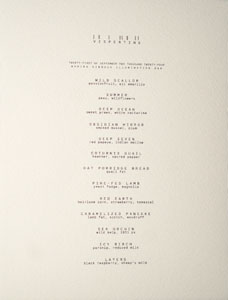
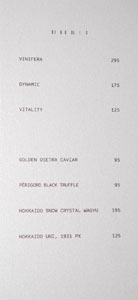
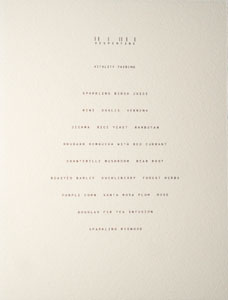
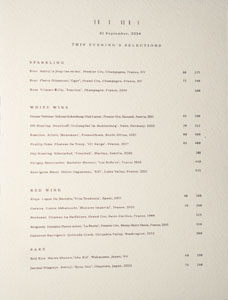
Here we see the menu, which is priced at hefty $395 per person. On top of that, there are various supplements on offer as well. The caviar and truffle represented additions to the mussel and corn custard courses, respectively, while the wagyu replaced the lamb and the uni replaced the birch ice. Libation-wise, choices included a non-alcoholic Vitality beverage pairing for $125, a mixed beverage Dynamic pairing for $175, or the Vinifera wine pairing for $295. Annoyingly, Vespertine doesn't actually have a proper wine list (consultation with a sommelier is required instead), though an abbreviated selection of wines available by the glass and bottle is available, as shown above. Corkage is $100, with a limit of only one. Click for larger versions.
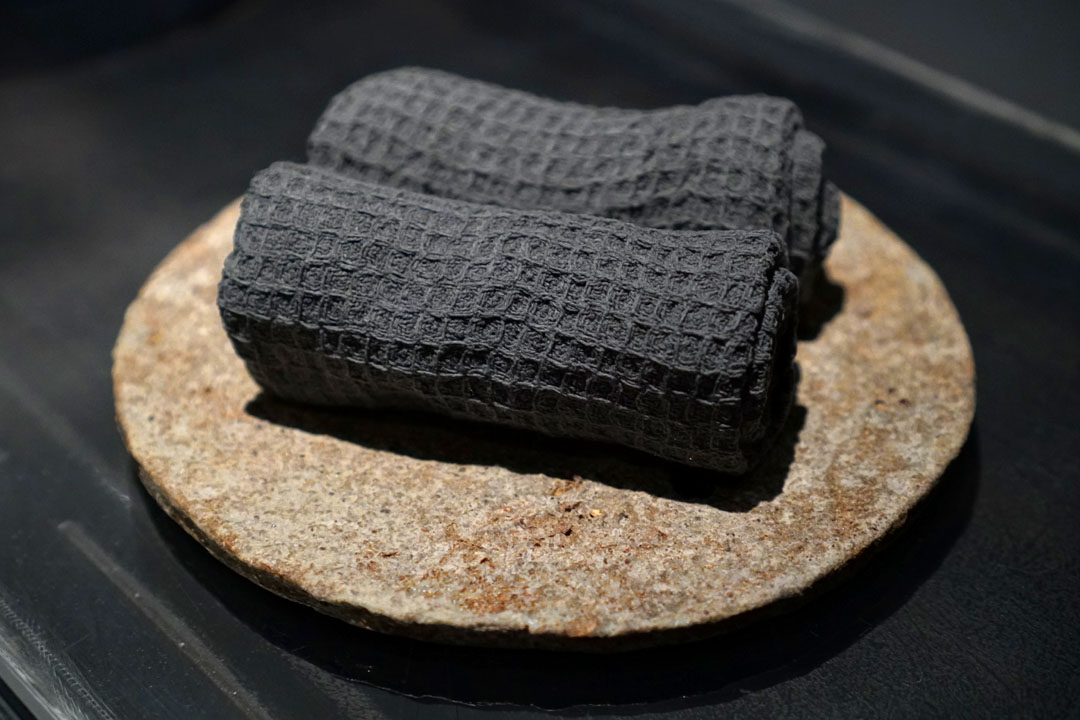
Upon being seated, a pair of oshibori was placed before us, warmed up for the cooler autumn weather we'd been having. The towels were more aromatic than most, giving off an almost mushroom-y scent.
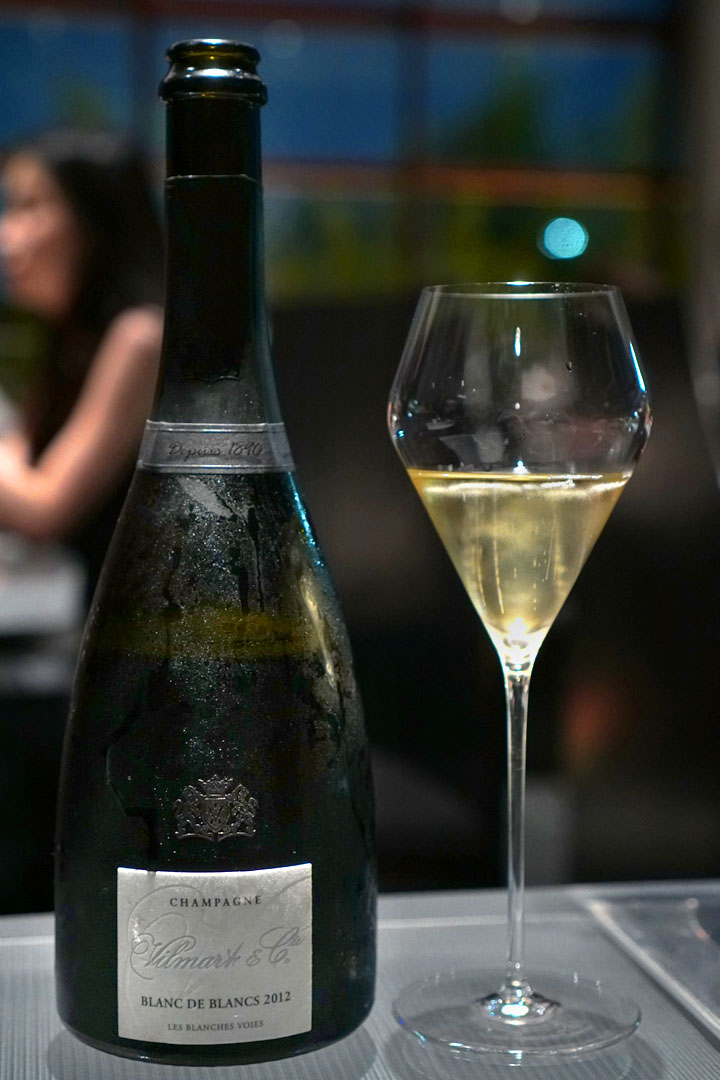
Given my love of Champagne, I brought along a bottle of the 2012 Vilmart & Cie "Les Blanches Voies" Blanc de Blancs (bottle Nº 4134/5800, disgorged November 2020) to pair with dinner. The bouquet presented itself in an intense, heady manner, offering up incredibly inviting aromas of warm brioche and stone fruit preserves. The palate wasn't quite as flamboyant, but still demonstrated a healthy amount of flowers, citrus, and orchard fruit, backed by an omnipresent underpinning of minerality. My second glass brought more toast-and-jam than probably any other sparkler I've tasted, while taste-wise, I began detecting more nutty, oxidative elements. Next, things got markedly yeastier and earthier, both on the nose and the tongue, but this didn't last long, as soon enough, the wine's mineral backbone became much sharper, much more apparent. Toward the end of the night, I started tasting even stronger sherried nuances, which certainly made for a fitting conclusion. Absolutely lovely.
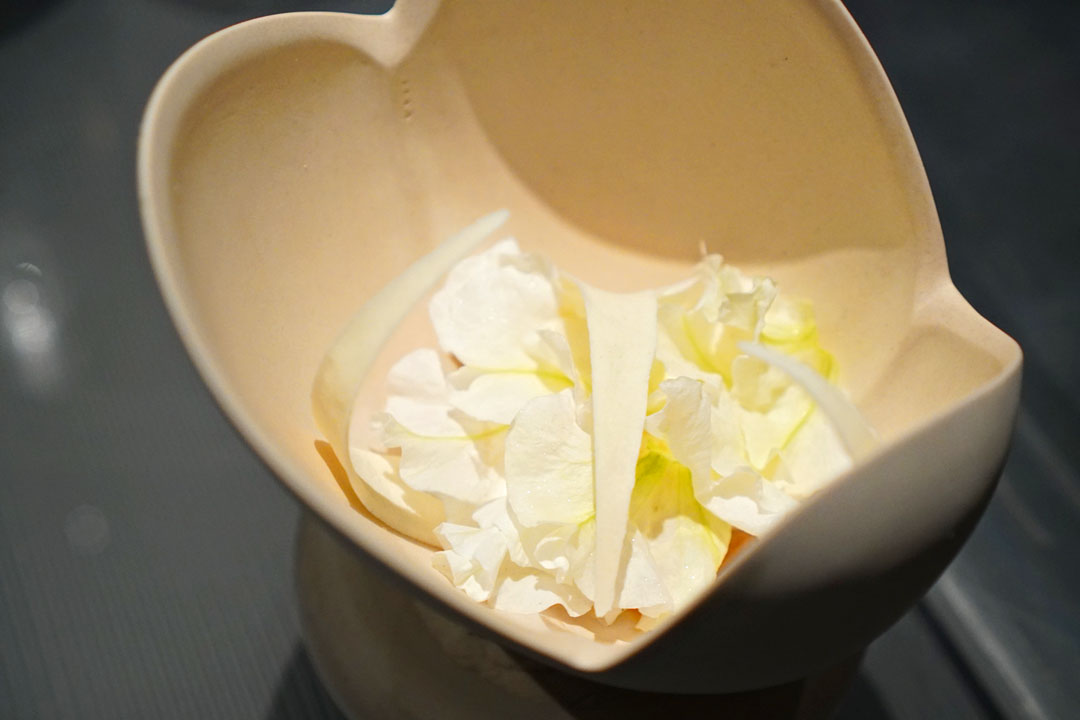
1: WILD SCALLOP | passionfruit, aji amarillo
Our first, decidedly monochromatic course presented slices of Weathervane scallop in both raw and cured forms. Curiously, the dish smelled somewhat of pàocài at first blush, which I didn't mind at all, and this sensation soon led to a juxtaposition of the creamy-sweet scallops with the tropical tartness of a passion fruit reduction, set over a backdrop of creeping heat from the ají. At the same time, there was a top layer of contrast between the dry, brittle horseradish crisps and those silky petunia petals, an interplay that really was key in helping the dish coalesce. My dining companion likened this to a thoroughly reimagined salad course to start the meal with, and I think that's an apt comparison.
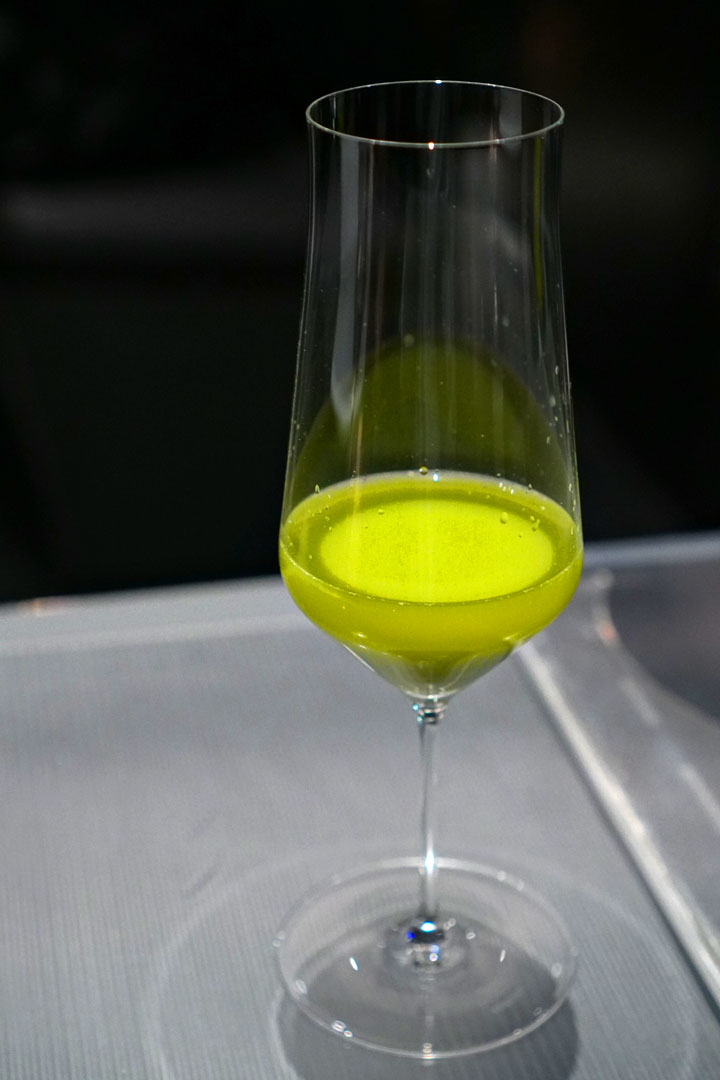
KIWI OXALIS VERBENA
In addition to the Vilmart above, we also opted for the non-alcoholic pairing, and first up was a housemade kiwi juice with oxalis and lemon verbena. Think refreshingly tangy and grassy on the nose, with a soft, sweet, tropical flavor profile.
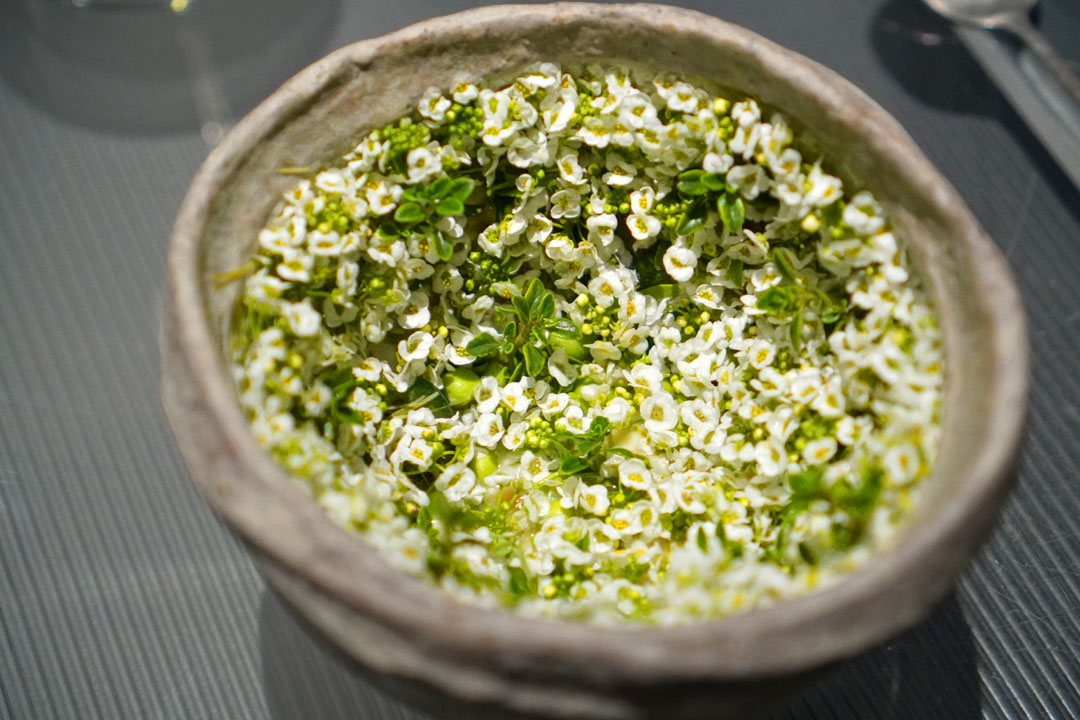
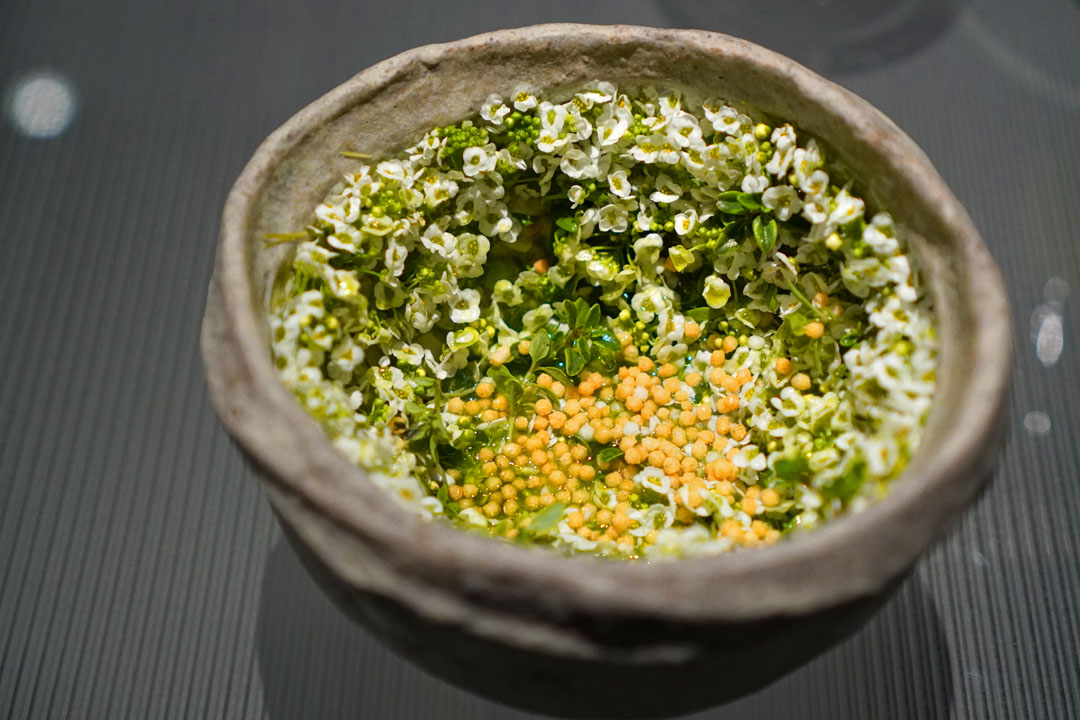
2: SUMMER | peas, wildflowers
Rather striking in presentation, this celebration of summer was composed primarily of wild herbs and flowers--some foraged and some grown in Vespertine's garden--along with snap pea shells, Allium, yuzu, kiwi, and puffed rice pearls. As you might expect, this ate super fresh, bright, and floral, with a wonderfully bitter spine and a creamy foundation, all while the arare imparted both crunch and savor. And despite the dish essentially being composed of flowers, it was surprisingly substantial. I also appreciated the bowl utilized, which required me to dig deep with my spoon, scraping my way up from the bottom to the top in clattering fashion. Meanwhile, my dining companion was actually reminded of an abandoned well, overrun with vegetation, and I liked that parallel.
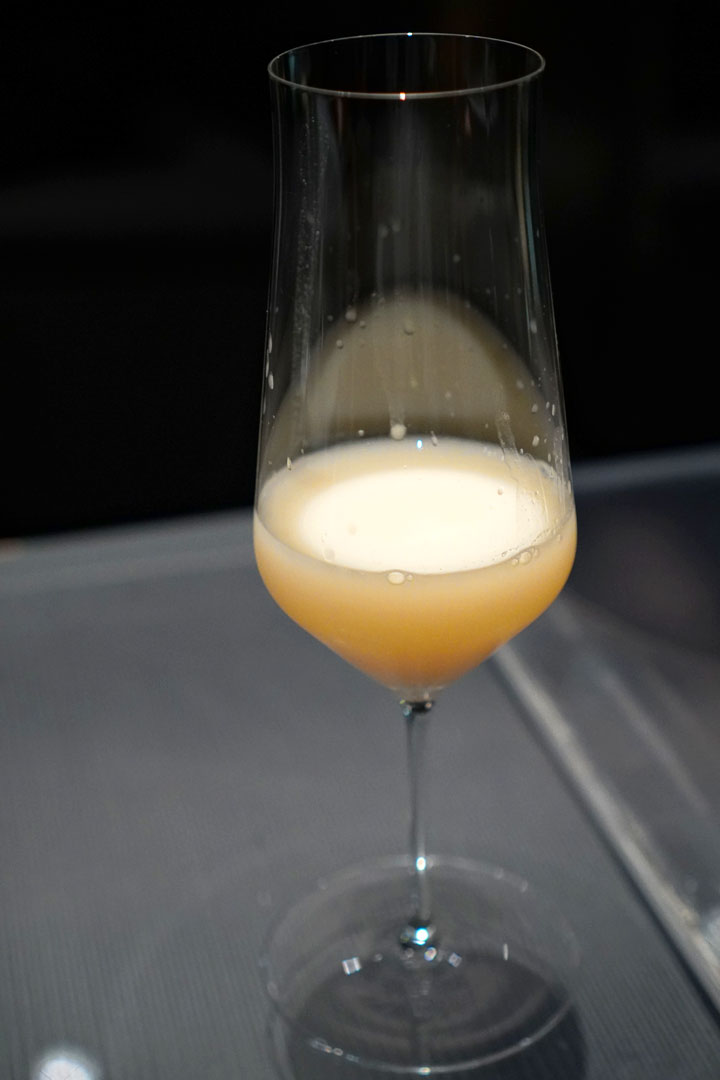
JICAMA RICE YEAST RAMBUTAN
Our next beverage was based on jícama, infused with rice yeast and rambutan, and could be compared to a non-alcoholic nigori-style sake. I found it milky and fruity and ricey on the nose, while the palate was even harder to pin down, but did recall a mash-up of soy milk and banana. I dig it.
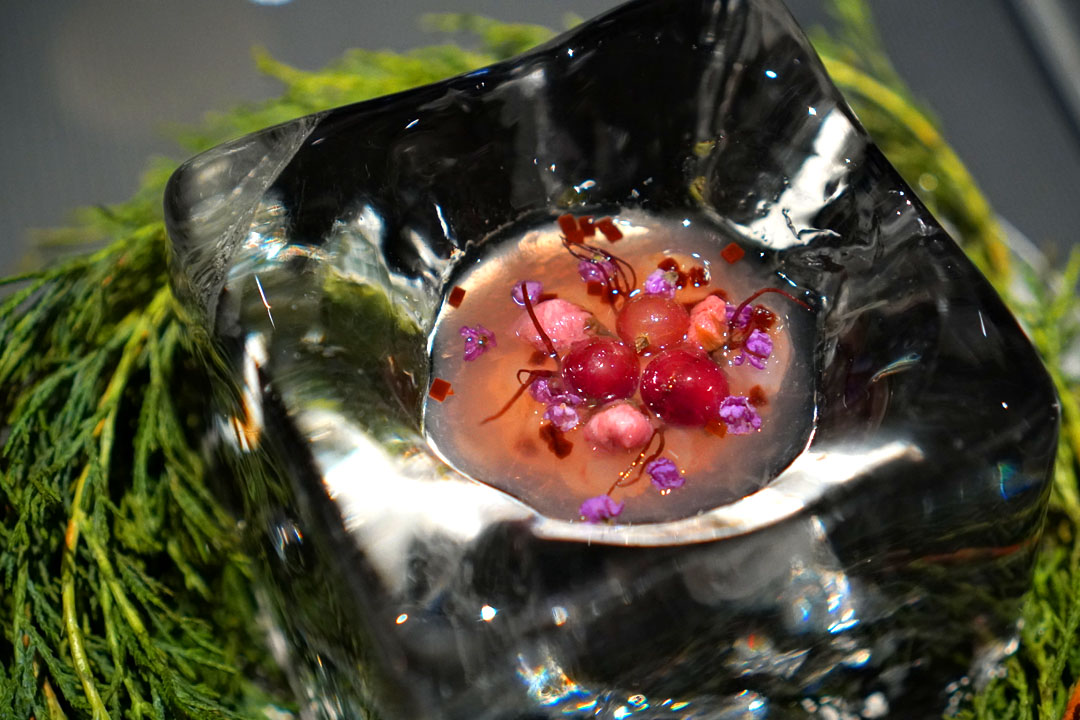
3: DEEP OCEAN | sweet prawn, white nectarine
Despite bearing a moniker of "Deep Ocean," this course reminded us more of a tide pool, which wasn't necessarily a bad thing. I loved the utterly floral, fresh, and nearly bracing nature of the dish, highlighted by the fruity-tartness of red gooseberry, ají panca, and nectarine vinegar, all with a bit of a spruce-y edge. However, the crux here was that shrimp, which had this soft sweetness and salinity that really counteracted the sharpness of the other components. Also of note is the serving vessel, which was just about the most impressively translucent block of ice I've seen. According to our server, it was made using boiled water, rapidly frozen while being agitated, then torched prior to service.
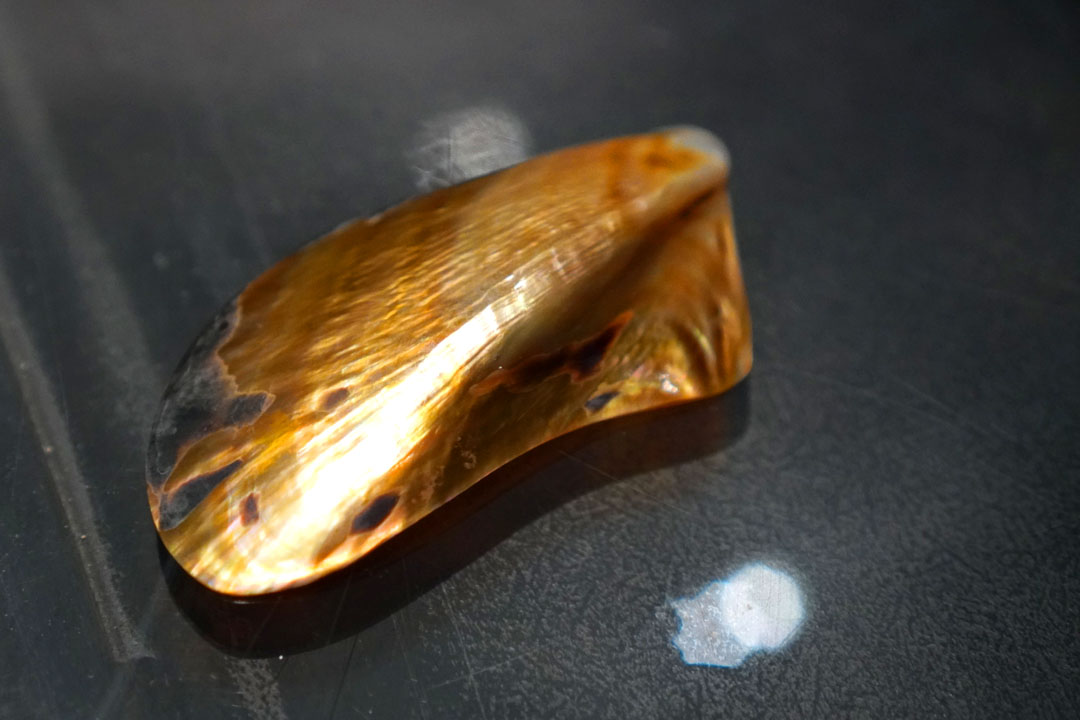
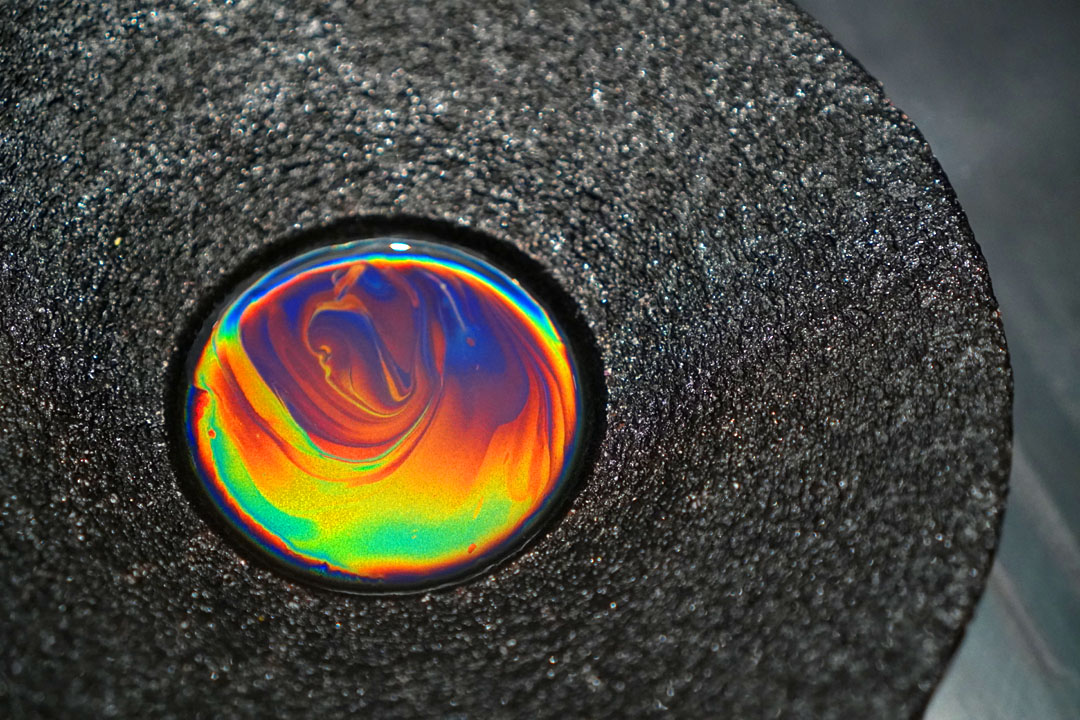
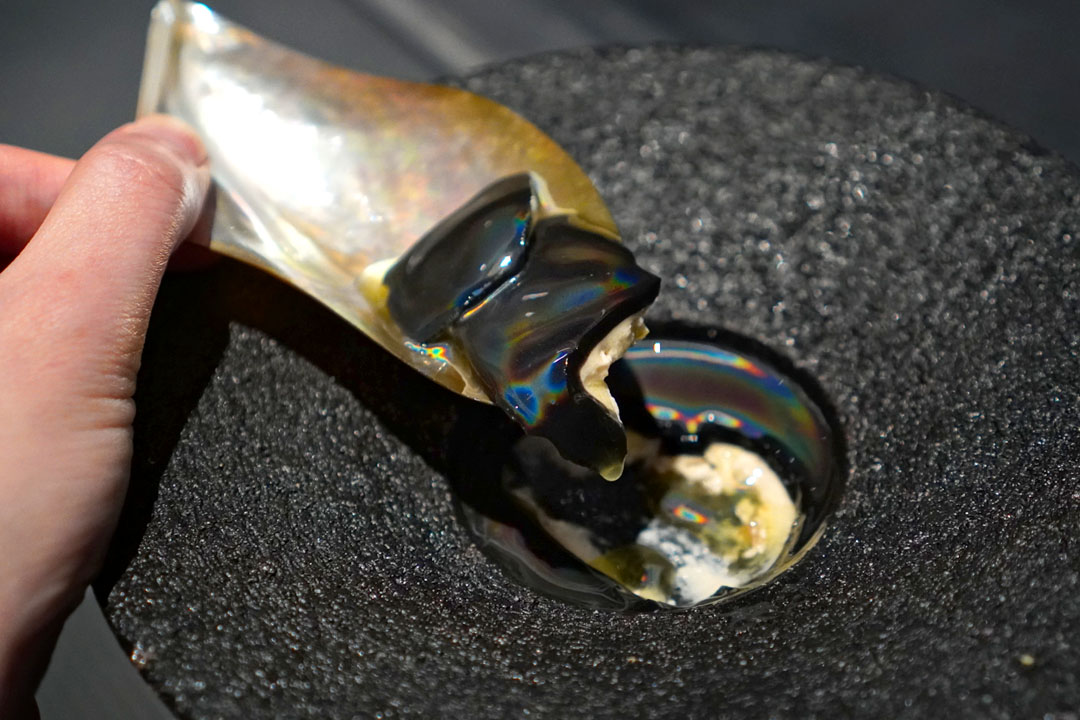
4: OBSIDIAN MIRROR | smoked mussel, plum
Inspired by the use of obsidian mirrors in pre-Hispanic Mexico as portals to different worlds, this dish has to be one of the most visually arresting I've ever encountered. The technicolor visuals were ostensibly produced by a layer of kombu oil, which resulted in the desired thin-film interference effect. Hiding underneath was mussel gelée and smoked mussel panna cotta, along with salted plum and what I believe was jícama. It all made for an amalgam of delightfully smoky and creamy notes that played off of the growing brine of bivalve. And yes, we used an actual mussel shell as our spoon, which added further to the experience.
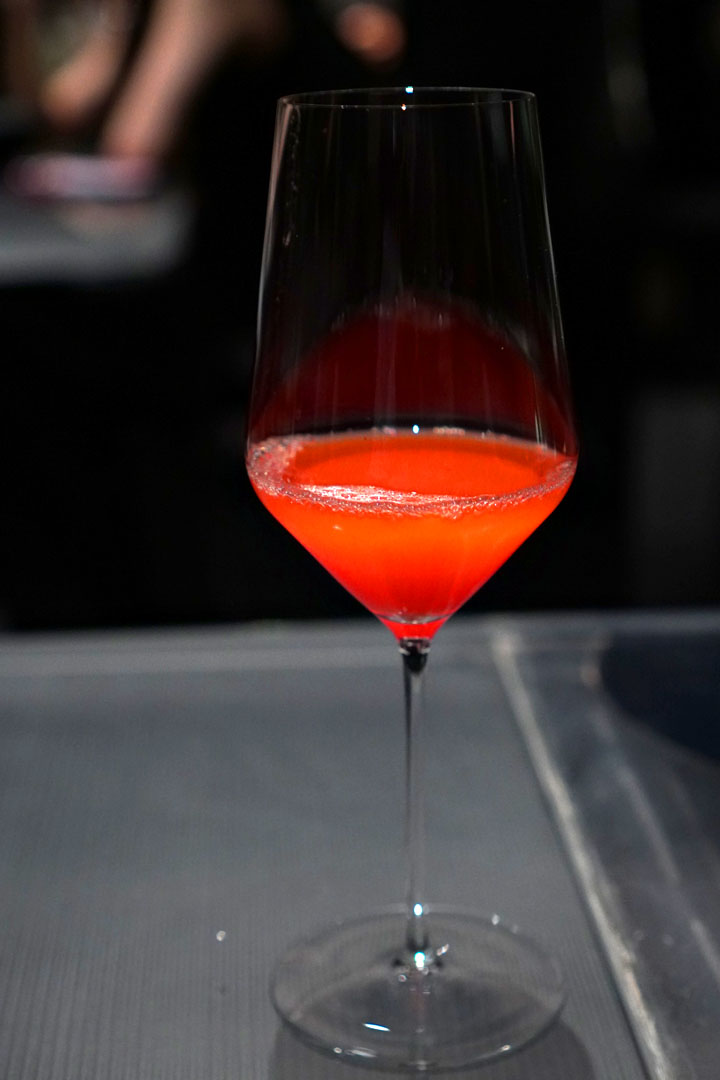
RHUBARB KOMBUCHA WITH RED CURRANT
Rhubarb kombucha recalled zippy bell pepper on the nose, while its taste went in a light, sweet, agreeably vegetal direction.
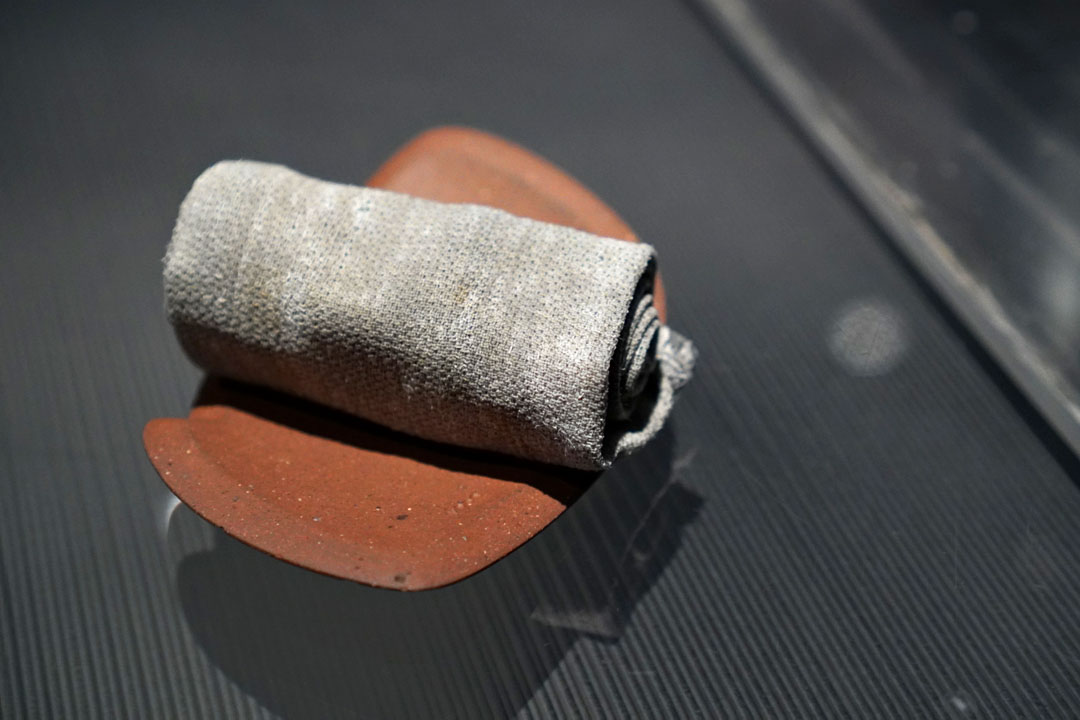
A moistened finger napkin was brought out due to the hands-on nature of our next course.
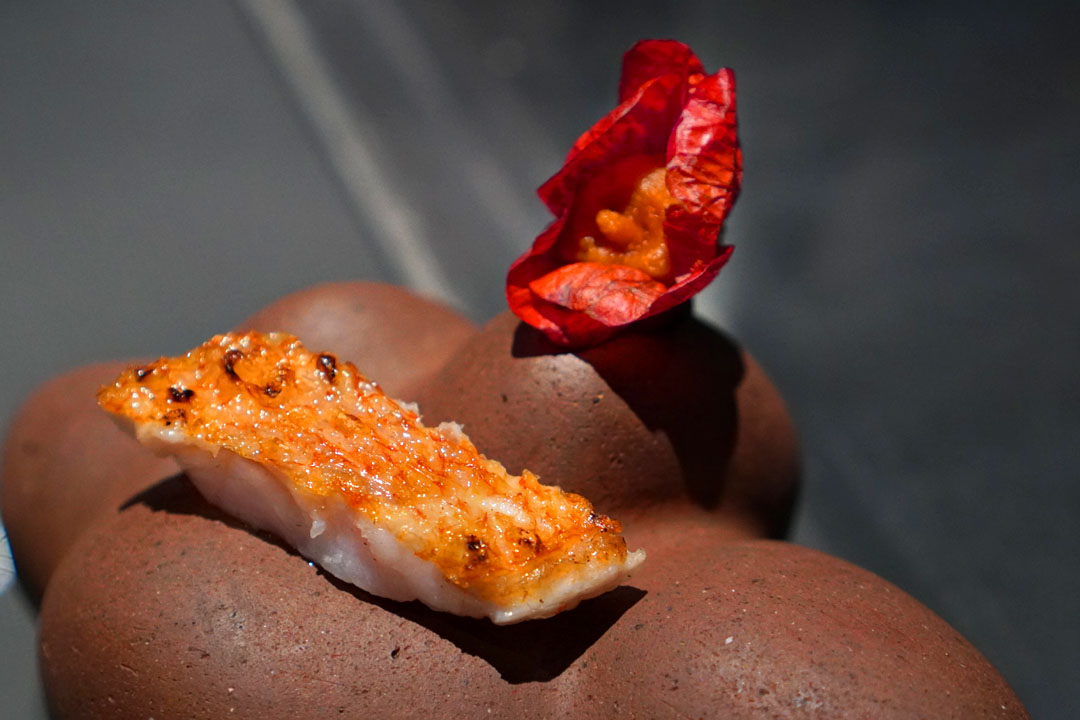
5: DEEP SEVEN | red papaya, indian mallow
This course was a nod to the "Deep 7" fishes of Hawaii, which apparently the Chef has good access to given his relationship with fishermen over in the islands. It wasn't quite clear which of the septet was presented tonight (I thought I heard "kinki," but that's not one of the seven), but I do know that it was lightly grilled over binchotan, seasoned with allspice, and presented with an Indian mallow flower stuffed with papaya paste, pepper, and rose. The fish showed off a silky, supple consistency and a crispy skin, while its smoky, savory flavors married surprisingly well with that tangy, fruity paste. It was a combo that I hadn't experienced before, yet reveled in--very neat.
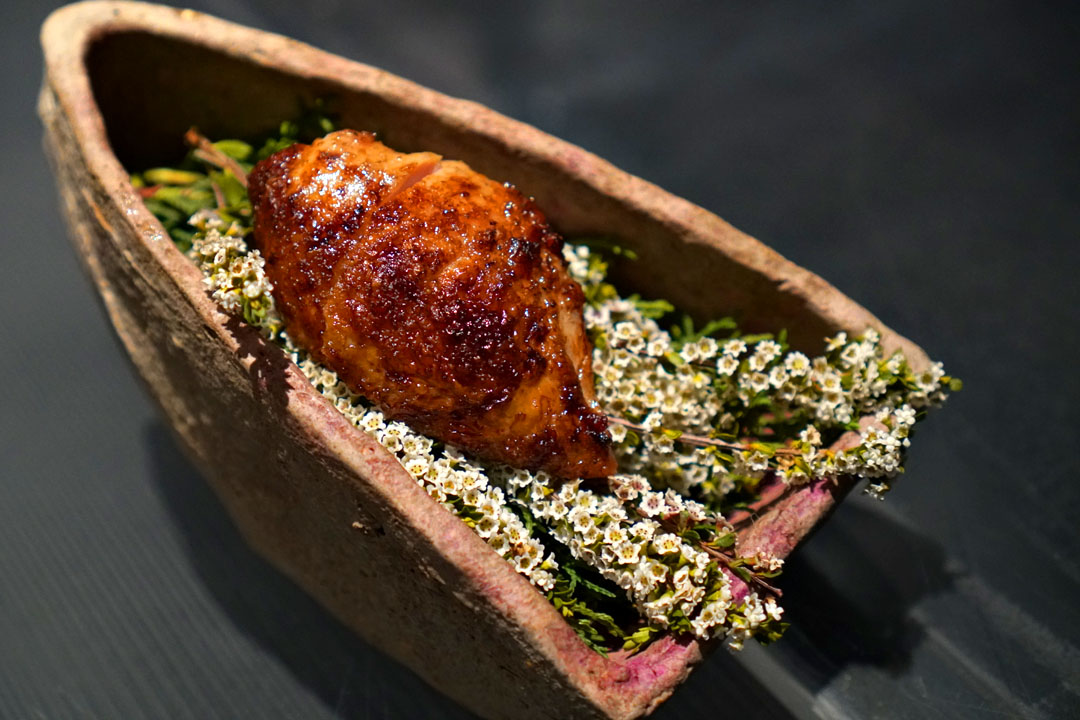
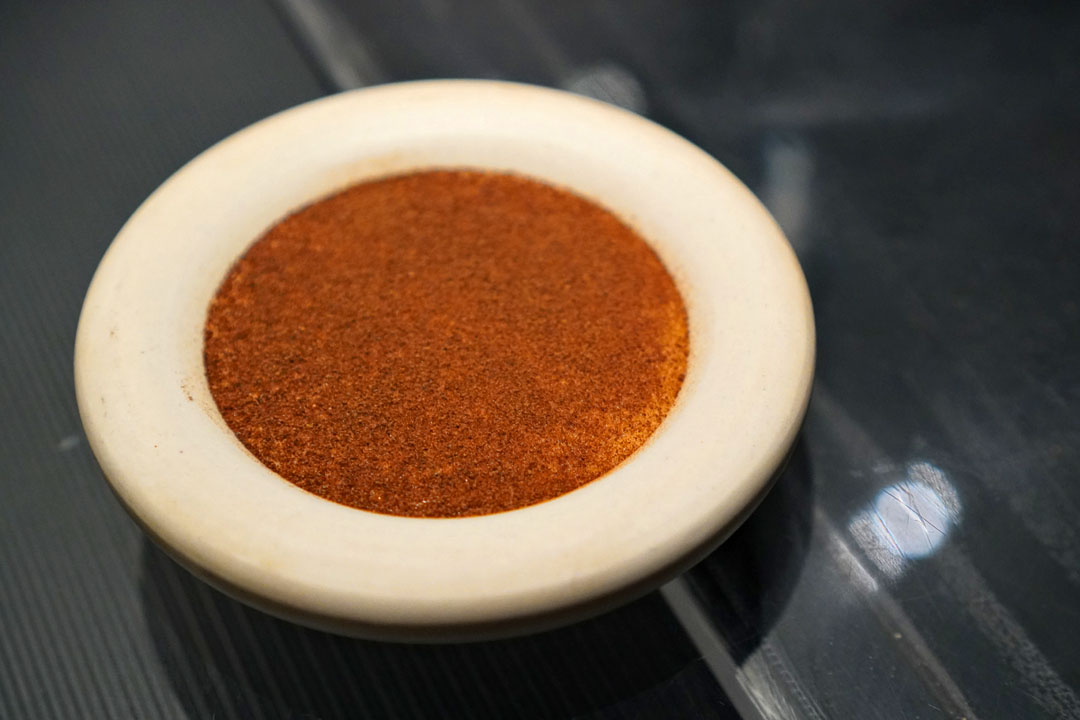
6a: COTURNIX QUAIL | heather, sacred pepper
Wolfe Ranch quail was served two ways. First, we had the breast, dry-aged for 10 days, cured in rice koji, grilled, and scented with the same flowers used in the second course above. It was one of the best preparations of the bird I've had, arriving juicy, tender, and mouthwateringly spiced, replete with both an elegant sweetness and a floral edge. The quail was joined by an emulsion of quail egg yolk, black trumpet mushroom, brown butter, and smoked butter, further dusted with what I think was powdered elder tree seed butter. It ate agreeably creamy, nutty, and subtly sweet--a smart match with the Coturnix.
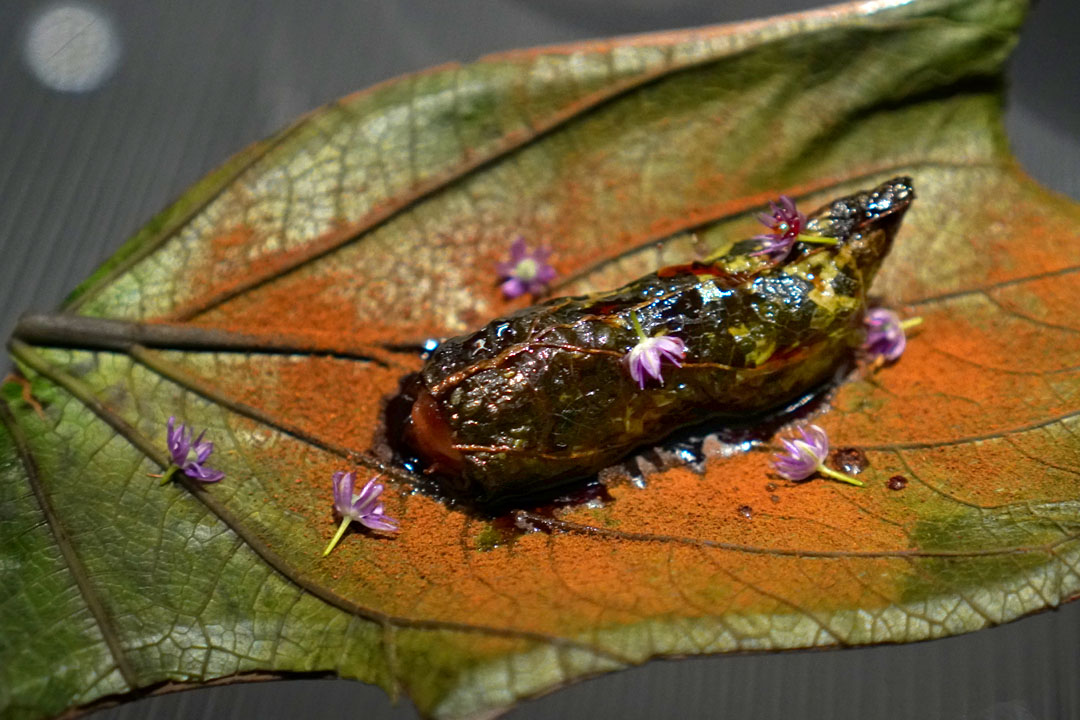
6b: COTURNIX QUAIL | heather, sacred pepper
In addition, we were presented with a roulade of thigh, deboned and wrapped in hoja santa leaf. I loved its firm, gratifying, almost sausage-like texture as well as its delectable seasoning and sweet, creeping, fragrant spice.
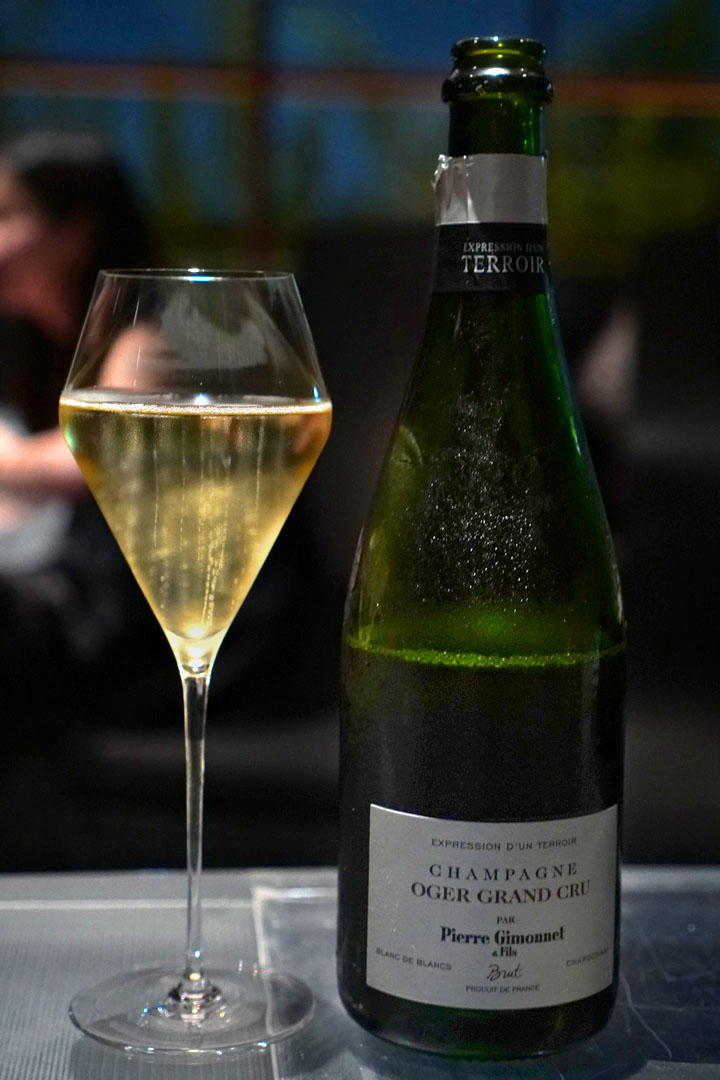
We had a bit of an incident where the Vilmart above slipped out of our server's hands and spilled onto the table. In repentance, he opened up a bottle of the Brut, Pierre Gimmonet, 'Oger', Grand Cru, Champagne, France, NV to make up for the mishap. The nose on this one was definitely lighter, less concentrated, with green apples at the fore, back by citrus and mineral. On the palate, I found plenty of lemon and yellow orchard fruit supported by a mash-up of nutty, bitter, and yeasty notes, along with plenty of acidity.
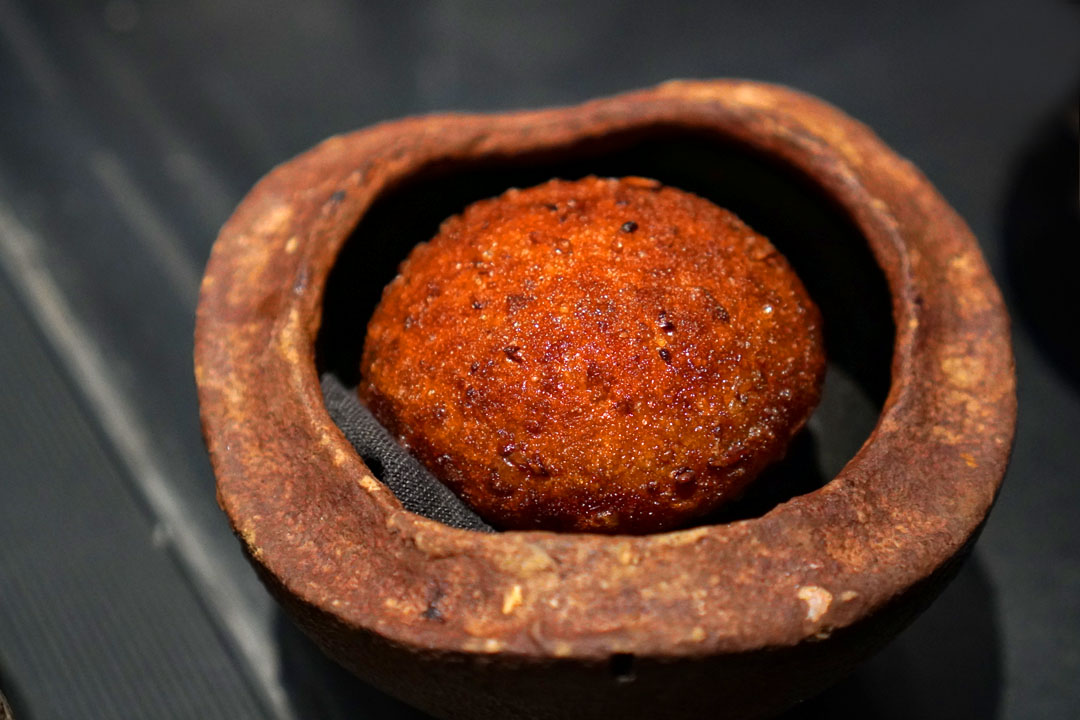
7: OAT PORRIDGE BREAD | quail fat
Bread service comprised this 48-hour foraged sourdough, which was deep-fried in rendered quail fat. The end result was fantastic, perhaps the best bread I've had all year in fact. I was especially fond of its chewy consistency, and in certain bites, I was even reminded of yóutiáo. Pro tip: dip the bread into the quail sauce above for some magnificent results.
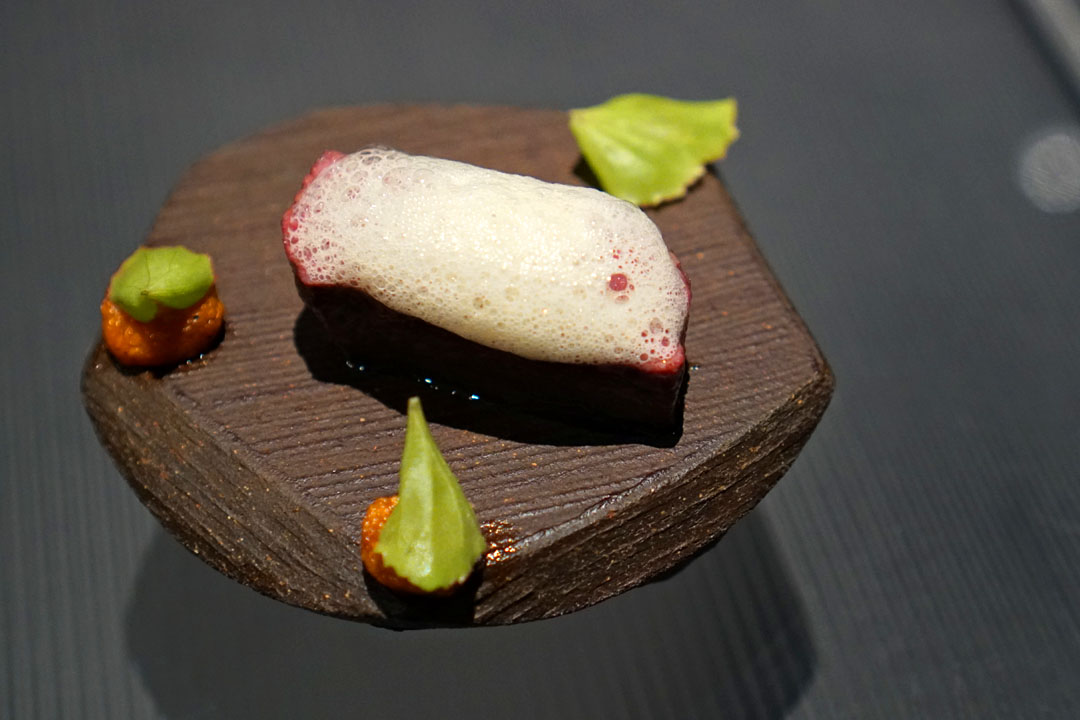
8: PINE-FED LAMB | yeast fudge, magnolia
Our final savory course brought Anderson Ranches lamb, topped with magnolia blossom butter emulsion, set on painted lines of umami-rich yeast fudge (made with sake yeast and lees), and joined by husk cherries crowned with tomato leaves. I loved the dense, satisfying bite of the lamb, which somehow conveyed luxury and austerity at the same time, while even more crucial was that back-and-forth between the dish's smoky and creamy elements, all accented by the piquancy of those ground cherries.

And with that, we retired into the first floor Gallery to wrap up the rest of our evening.
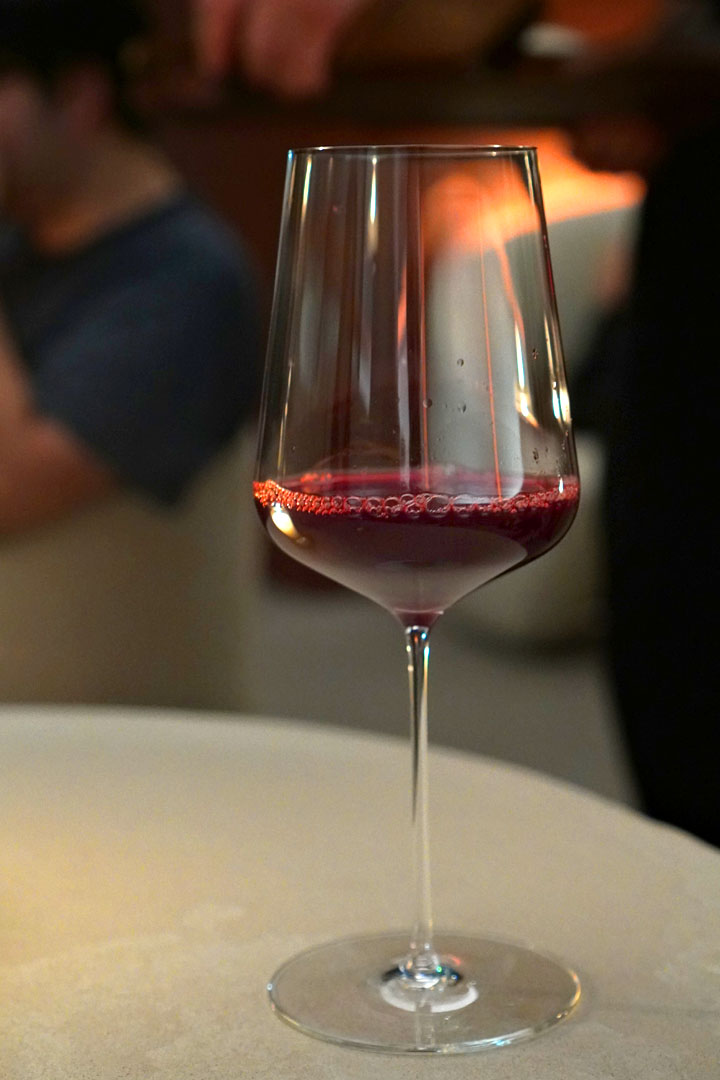
PURPLE CORN SANTA ROSA PLUM ROSE
Our first beverage downstairs was a chicha morada-like juice of ancient purple corn, Santa Rosa plum, lapsang tea, and pickled rose. Cool, sweet, and vinous, the drink actually reminded me of the aromas you might find inside a Napa Valley winery barrel room, curiously enough.
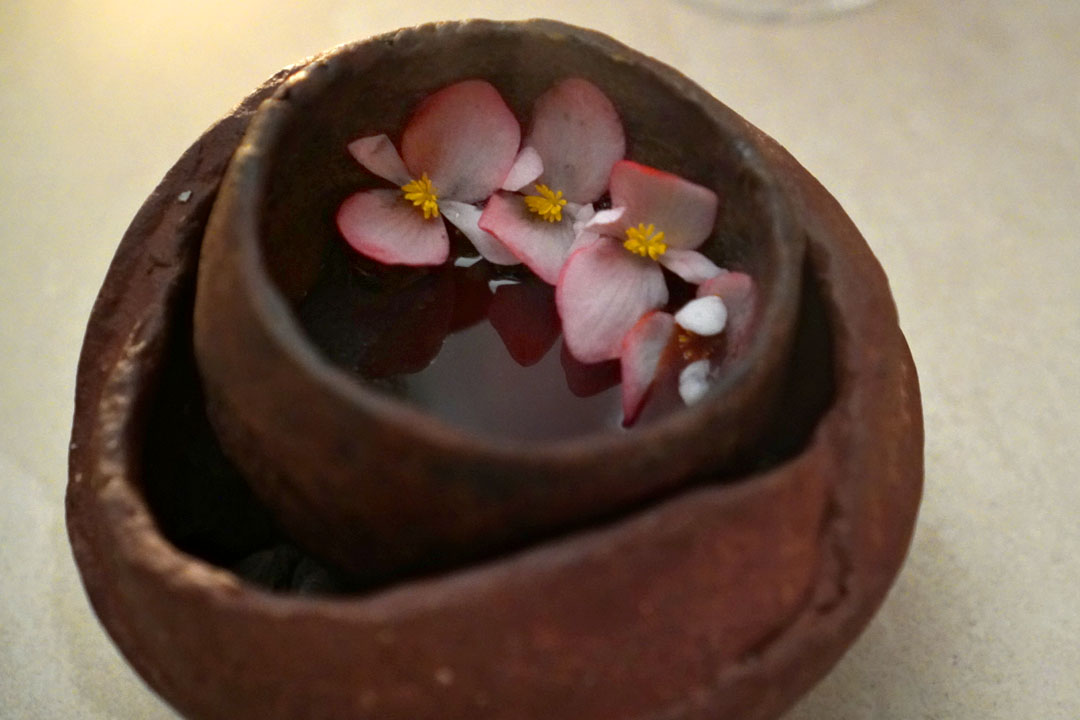
9: RED EARTH | heirloom corn, strawberry, temascal
The first of two transition courses, this dish was inspired by a trip that the Chef and his wife Zara Ziyaee Kahn took to Nayarit, where they were in search of a thousand-year-old sacred palm tree. During the process, they also participated in a meditation ritual using tree resin that they had collected along the way, and this is the Chef's attempt to recreate that experience through taste. What we had was a sweet corn custard with huitlacoche, dehydrated strawberry coated in chile, barley koji cake, and smoked pepper broth on top, surrounded by hot stones, on which water infused with palo santo bark was poured, thus revealing a wonderful perfume. The result of all this was simultaneously rustic yet elegant, with a composite of sweet and savory tinted by tart berry and a smidge of chili-fueled heat. This is apparently Kahn's favorite dish, and I can understand why.
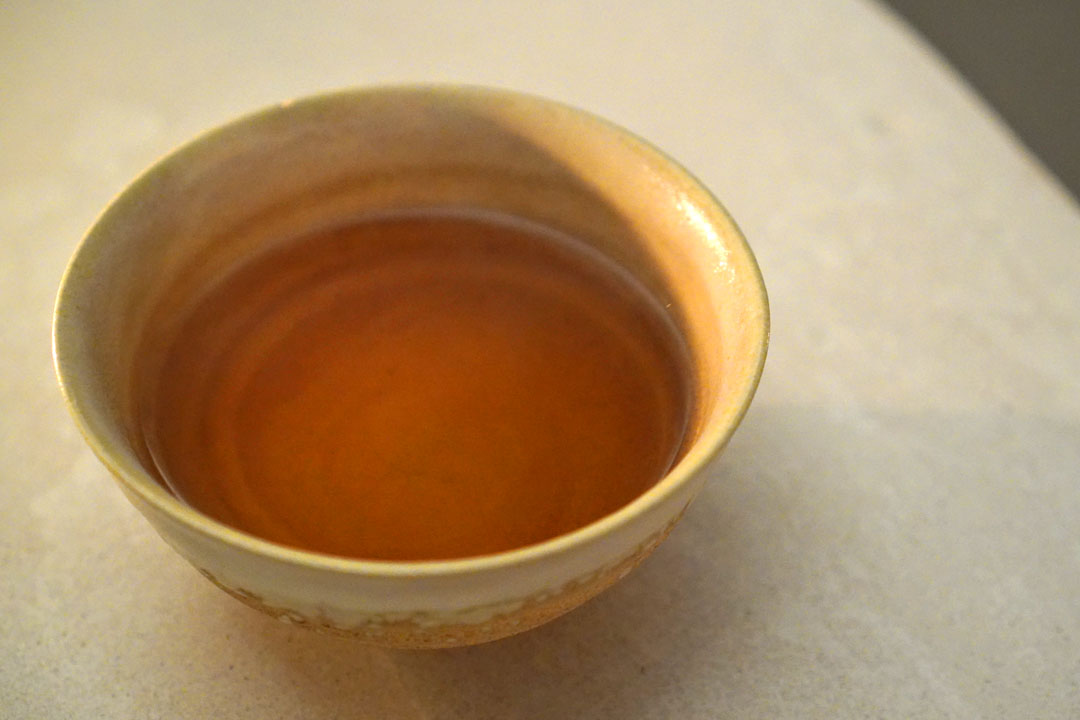
DOUGLAS FIR TEA INFUSION
A hot, homey infusion made from Douglas spruce was teeming with all those piney flavors I was looking for. I even had an extra serving of this.
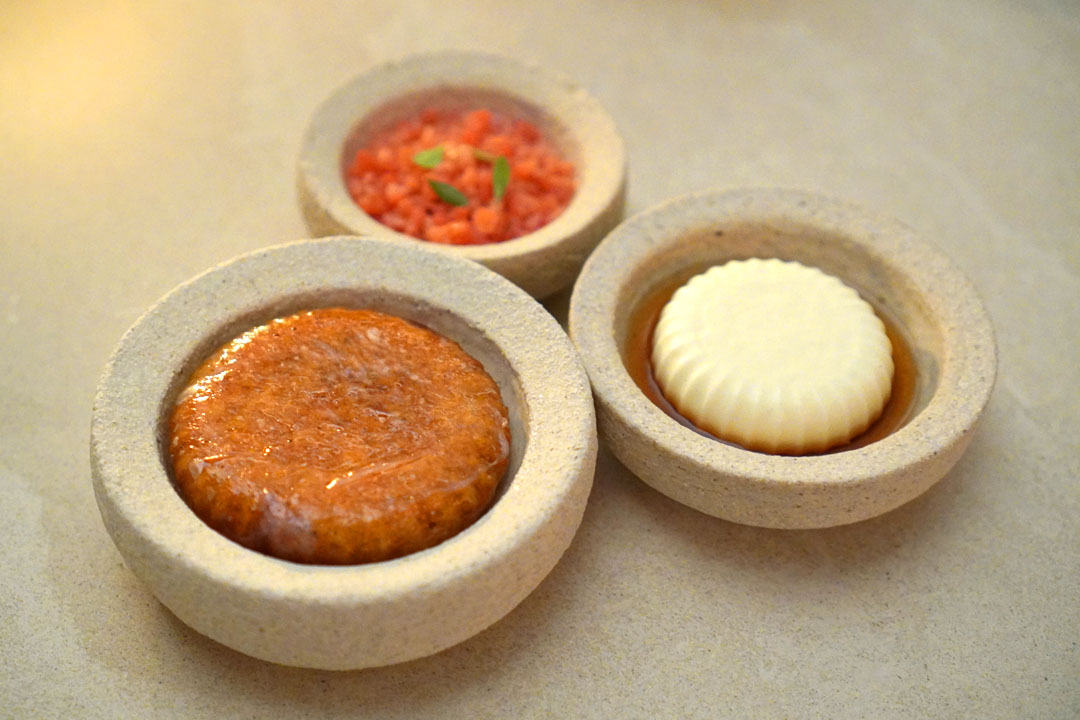
10: CARAMELIZED PANCAKE | lamb fat, scotch, woodruff
The second transition course comprised a sourdough pancake caramelized in maple, then coated with a sheet of salted lamb fat, served with whipped cream and birch sap syrup infused with Laphroaig 10, as well as steamed raspberries. Taken all together, this was probably the best pancake I've ever eaten, and totally reminded me of the syrup-slathered stacks of my childhood, but with heightened savor and sophistication. I was particularly fond of the booziness contributed by the whisky, and the zippiness of the fruit.
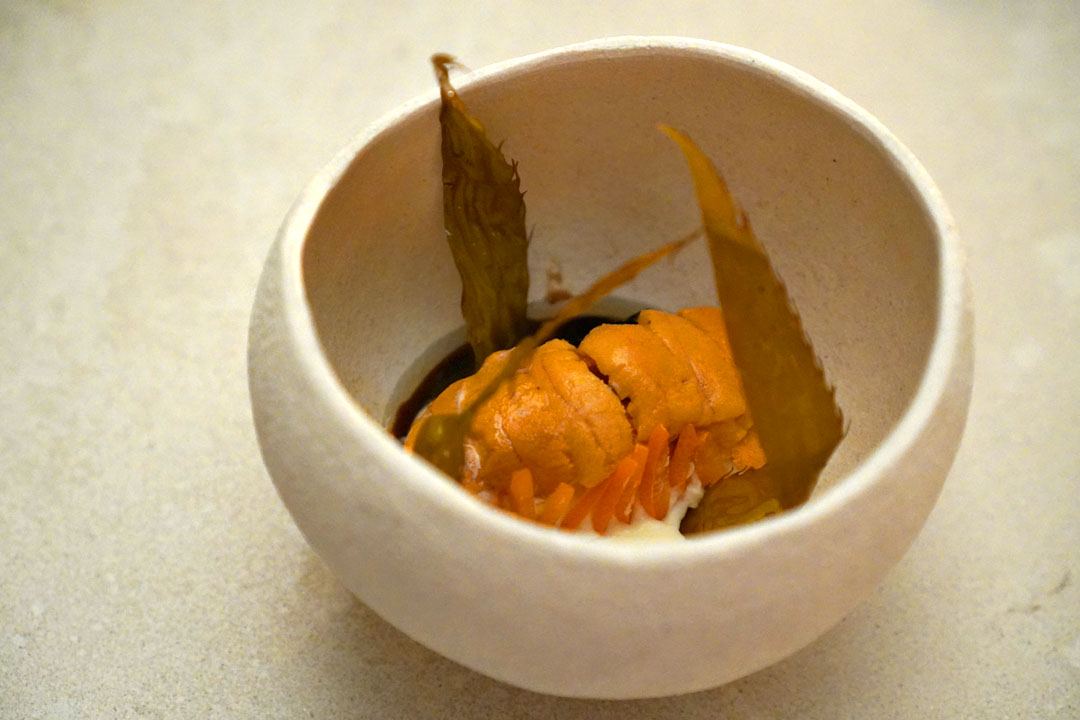
Bonus: SEA URCHIN | wild kelp, 1931 px
As a result of the aforementioned accident with the Champagne, we were also gifted the supplemental sea urchin dessert course, which was composed of Hokkaido bafun uni fermented in elderflower, white chocolate ganache, young preserved black walnuts, candied kelp, and a splash of Bodegas Toro Albala Pedro Ximénez sherry. The way the sweetness of the roe melded with the other components of the dessert was genius, and I loved the finishing touch provided by the PX's intensely sugary, dark fruit-laden, almost balsamic-like flavors, not to mention the dish's spruce-y accent. I'd never had sea urchin like this before, and I was surprised at how much sense it made as dessert. Super neat and special.
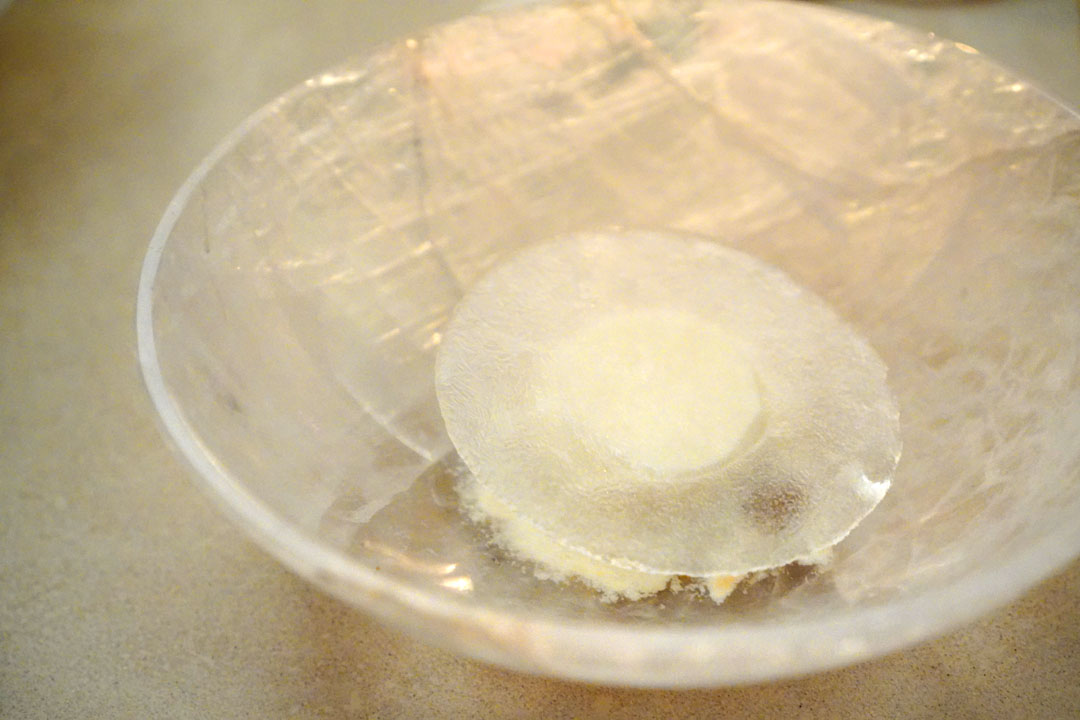
11: ICY BIRCH | parsnip, reduced milk
Kahn definitely has a penchant for birch that dates back to at least his Red Medicine days, so I wasn't surprised to see the ingredient on the menu tonight, rendered as a disk of frozen birch juice sitting atop a parsnip-tiger nut ice cream and plantain. I appreciated the dessert's monochromatic, translucent aesthetic, and even more so its multifaceted sweetness and array of textures, while there was also this ever-growing minty character that caught me off guard.
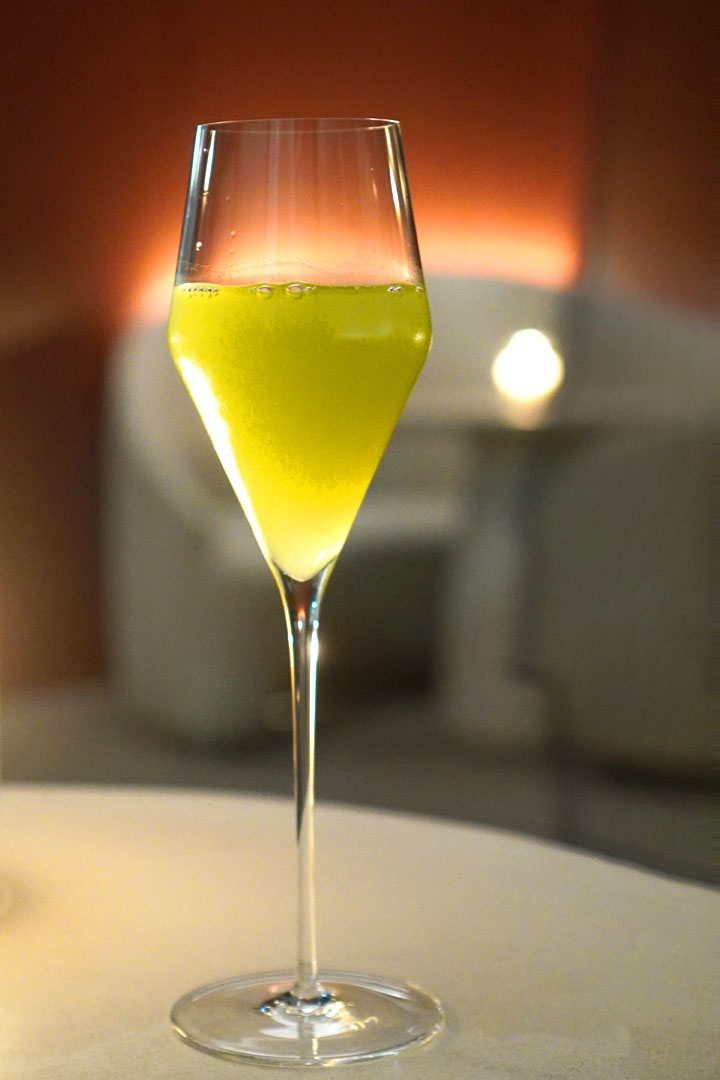
SPARKLING REDWOOD
Our final beverage was made from redwood shoots foraged from the base of trees, combined with verjus for sweetness, then carbonated. The result was a light, bright, refreshing drink that actually made me think of guava juice.
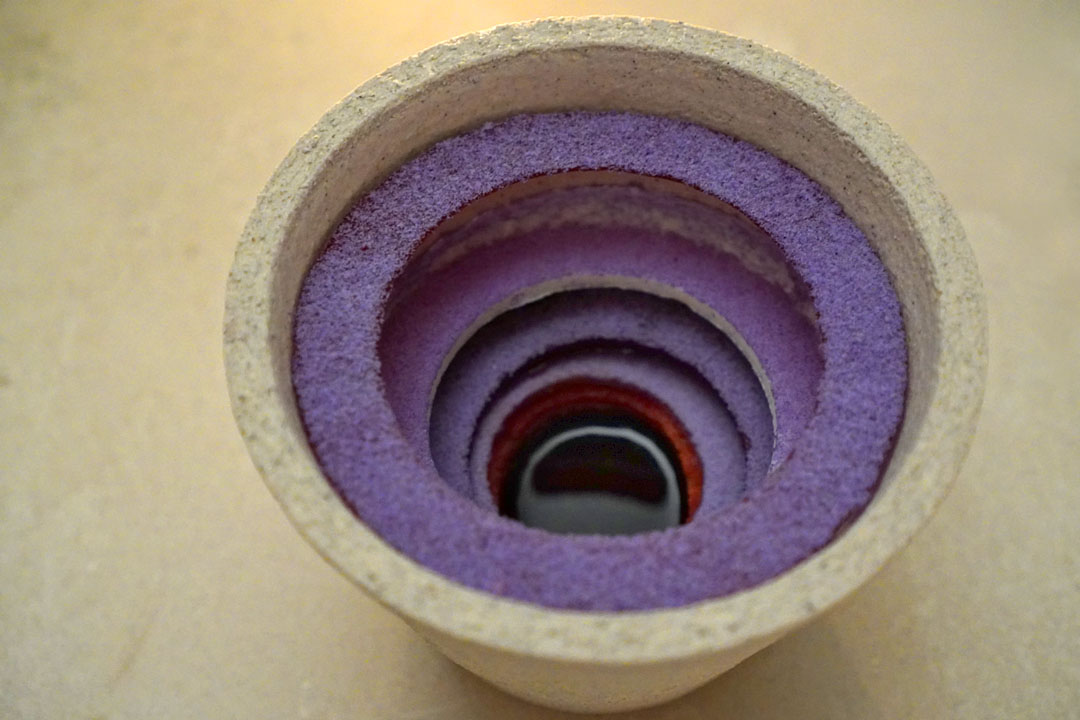
12: LAYERS | black raspberry, sheep's milk
Last up was a reinterpreted entremet cake, dramatically presented with each concentric layer offering a different taste and texture. Starting at the top, we had candied beets, Arctic rose, sheep's milk yogurt, almond praline, and beet genoise sponge cake, while at the very bottom was a black raspberry panna cotta. As with the "Summer" course above, I had to dig deep to get all the layers in one go, but was rewarded with a mish-mash of nutty, berry, savory, and lactic facets that satisfied in an almost nostalgic way (think PB&J).
Regrettably, I never made it out to this restaurant's first iteration, but was a bit wowed by Vespertine 2.0. There's nothing else like it in LA, maybe not even in the entire country. While Kahn once likened the previous version of Vespertine to a "spaceship," what we enjoyed tonight seemed much more down-to-earth, with a distinct pre-Columbian Mesoamerican through line. The food was still cerebral and contemplative, but not as much as I'd expected. Rather, the cooking veered more toward the heartfelt, the honest, the overtly pleasurable, and this apparently reflects changes in Kahn's attitude, which has been molded by both Zara and the happenings of the past several years. Hopefully, this new approach will earn the team more accolades, perhaps even their third Michelin star. That is the ultimate goal according to our server, but to get there, I do think that the service should be tightened up, as there were a few missteps tonight, most notably the omission of some beverage pairings. That's nothing that can't be corrected though, so I am optimistic that we may have Los Angeles' first three-star in the making here.